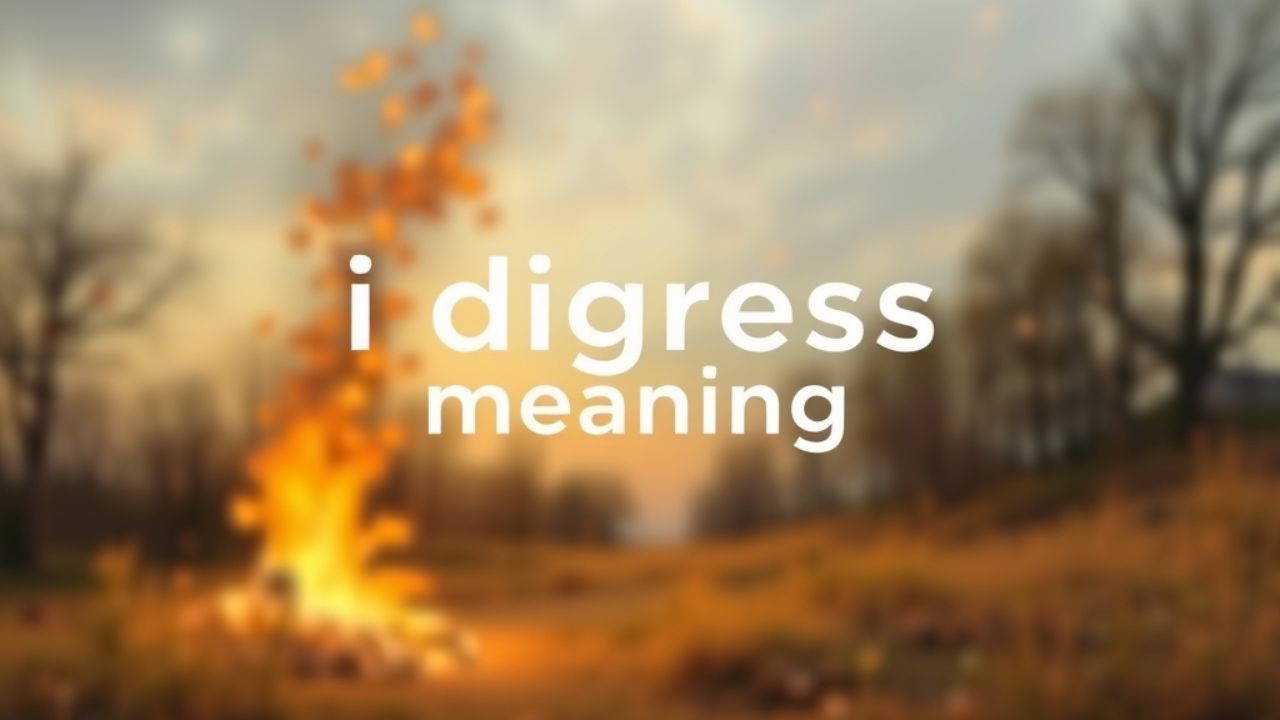Have you ever been in the middle of a story, drifted onto another topic, and then quickly corrected yourself with the phrase “I digress”? This little expression has been around for centuries, yet it still slips naturally into modern conversations, writing, and even online communities. It’s a stylish way of admitting you’ve strayed from the main point before bringing the listener back on track.
At its core, “I digress” means “I’ve gone off-topic.” But it’s more than just a confession—it’s often used to add personality, humor, or even self-awareness to communication. People use it when they want to acknowledge a tangent without losing their audience completely. That’s why you’ll see it in speeches, literature, or even on platforms like Reddit, where users employ it playfully.
Understanding this phrase isn’t just about vocabulary; it’s about grasping how people use language to shape conversations. By looking at its definition, history, and everyday usage, you’ll see why “I digress” continues to hold a unique place in English. It’s not simply filler—it’s a subtle tool for connection, wit, and clarity.
What Does “I Digress” Mean?
The phrase “I digress” comes from the verb digress, meaning “to temporarily leave the main subject.” It’s often used when a speaker realizes they’ve wandered off track.
The word traces back to Latin digredi, which means “to step aside.” In modern English, it’s more of a stylistic expression than a necessity—showing self-awareness and sometimes humor.
Why Do People Say “But I Digress”?
Adding “but” softens the shift and acknowledges the detour. It’s a polite way of saying, “I went off-topic, now let’s return.”
For example:
- “We were talking about coffee, and somehow I ended up ranting about tea. But I digress…”
This makes conversation feel lighter and more engaging rather than abrupt.
When Should You Use “Digress”?
Use it when you’ve gone slightly off-topic but want to return smoothly. It fits best in storytelling, public speaking, or witty writing.
However, avoid it in very formal business communication—it may sound unnecessary or overly dramatic. A simple “anyway” often works better in those settings.
What Can I Say Instead of “I Digress”?
Here are some natural alternatives:
- Anyway – casual and widely used.
- Back to the point – clear and direct.
- Moving on – neutral, works in meetings.
- As I was saying – conversational and friendly.
Each works depending on tone. For example, in a lighthearted blog post, “anyway” fits better than “back to the point.”
What Does “But I Regress” Mean?
Sometimes people mistakenly say “but I regress.” While similar in sound, regress means “to go backward.”
So if you say, “I regress,” you’re technically admitting to moving back to an earlier state, not changing the subject. It’s often used incorrectly as a humorous twist.
What Does Digress Mean in Slang?
Online, especially in casual chats or memes, “I digress” can be used playfully. People throw it in after a tangent to mock themselves for rambling.
Example:
- “I was supposed to talk about my workout, but here I am writing about pizza again. I digress.”
This informal use makes the phrase more relatable to younger audiences.
What Is an Example of a Digression?
Imagine you’re explaining a movie plot:
“The hero travels across the desert. Speaking of deserts, did you know the Sahara is the largest hot desert in the world? Anyway, back to the movie—he finds an ancient temple…”
That middle part about the Sahara is the digression. It’s an off-topic detour that interrupts the flow.
Is Digressing a Good or Bad Thing?
It depends. A well-placed digression can make speech colorful and entertaining. Storytellers often use it to add humor or depth.
However, constant digressions can frustrate listeners, especially if they’re looking for clarity. The key is balance—add flavor, but don’t lose focus.
What Is a Synonym for the Word Digress?
Some synonyms include:
- Ramble – casual, often with a negative tone.
- Wander – gentle, less critical.
- Deviate – more formal, often used in writing.
- Stray – simple and conversational.
Each carries a different nuance. For instance, ramble feels less intentional, while digress implies self-awareness.
Where Did “I Digress” Come From?
The term originates from Latin digredi, meaning “to step away.” It entered Middle English through Old French and has been in use since the 16th century.
Writers like Jonathan Swift and Charles Dickens frequently used digressions in their works, sometimes even directly saying “I digress” to the reader.
What Does “I Digress” Mean on Reddit?
On Reddit and similar platforms, “I digress” often shows up at the end of a humorous tangent. It’s usually sarcastic or tongue-in-cheek.
Example from a Reddit thread:
- “I was just talking about pineapple pizza, but now I’m ranting about kitchen knives. I digress.”
It’s become part of meme culture, often signaling self-aware rambling.
Everyday Usage: How to Use “I Digress” Naturally
- Use it sparingly so it doesn’t lose impact.
- Place it after a clear tangent.
- Keep it playful in casual settings and witty in professional writing.
Example dialogue:
- Friend 1: “This reminds me of that trip we took… oh wait, I digress, let’s get back to the plan.”
- Friend 2: “No worries, I enjoyed the detour.”
Conclusion
In the end, “I digress” is more than a throwaway phrase—it’s a clever way to acknowledge detours in thought while keeping your audience engaged. Whether used in casual conversation, professional writing, or witty online banter, it signals both self-awareness and a smooth transition back to the main subject.
By understanding its meaning, origins, and modern usage, you can recognize when it adds charm and when it may distract. So the next time you catch yourself wandering off-topic, don’t worry. A well-timed “I digress” might just make your storytelling more relatable and memorable.

Welcome to Bloomnis.com! I am the admin, here to bring you the best jokes and laughter. My goal is to make your day brighter with funny content. Enjoy jokes, puns, and humor anytime. Keep smiling and have fun with us. Laughter is the best medicine!
















